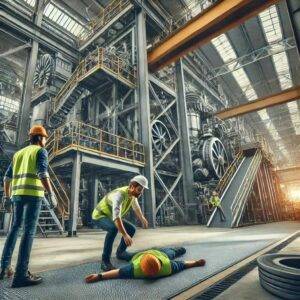
Most employers in Melbourne, Florida are required to carry workers’ compensation insurance. This is to cover workers injured or stricken ill while performing their jobs. You are entitled to workers’ compensation benefits if you suffer a job-related accident.
What Is Workers’ Compensation in Florida?
Florida workers’ compensation is defined in specific terms. It’s helpful to understand its key legislation, obligations during the claims process, protection against retaliation and time limits for filing.
Key Legislation: Florida Workers’ Compensation Law
According to Florida Statute 440.02, employers with at least five workers must carry workers’ compensation insurance. It compensates employees injured or ill on the job.
Obligations During the Claims Process in Florida
You have obligations during the workers’ compensation claims process. Notify your employer within 30 days of your injury and seek medical treatment. Document everything related to your injury or illness, including expenses.
Protection Against Retaliation
According to Florida Statute 440.205, employees are protected against retaliation by their employers. It’s illegal for employers to retaliate against employees for filing workers’ compensation claims for job-related injuries or illnesses.
Time Limits for Filing Claims in Florida
There is a statute of limitations on injury claims, including those involving work-related incidents. Florida law imposes a two-year limit on filing workers’ compensation claims.
Free Case Evaluation
Please describe what happened. We will review your case for free and work to secure the highest legal compensation possible.
5000+ Cases Reviewed

Sebastian Martinez
$200,000 Verdict
"Our family is flat out impressed with the Andrew Pickett Law firm technical mastery, they never wavered with kind direction as our recovery prolonged during the COVID-19, and they delivered the maximum settlement possible."
Benefits Available Under Florida Workers’ Compensation
Different benefits are available under Florida workers’ compensation. They include medical benefits, lost wages, permanent partial disability benefits, permanent total disability and death benefits.
Medical Benefits in Florida
Medical benefits pay for everything related to treating job-related injuries or illnesses. This includes doctor visits, hospitalization, diagnostic testing, prescription medications, surgery, physical therapy and more.
Lost Wages (Temporary Total Disability, Temporary Partial Disability)
Workers’ compensation pays for a percentage of your lost wages. Temporary total disability is paid if you can’t work for some time. Meanwhile, temporary partial disability benefits are paid if you can work in a limited capacity while you recover.
Permanent Partial Disability Benefits in Florida
Workers who suffer an impairment or loss of organ use can recover permanent partial disability benefits. These benefits compensate workers for income lost due to their disability.
Permanent Total Disability Benefits in Florida
According to Florida Statute 440.15, permanent total disability benefits compensate injured workers at 66 2/3% of their average weekly wages. Employees who cannot return to work due to permanent disability are eligible for such benefits.
Death Benefits
If a person is killed on the job, their survivors recover death benefits. Workers’ compensation provides funeral and burial expenses and monthly payments of up to 50% to the employee’s spouse for their lifetime or until their youngest child turns 18.
Types of Injuries and Illnesses Covered in Melbourne, Florida
Different types of injuries or illnesses are covered in Florida. They include physical injuries, occupational illnesses, mental health conditions, aggravation of preexisting conditions, specific scenario injuries and occupational diseases.
Physical Injuries
Workers can get workers’ compensation for physical injuries. These include back injuries, neck, shoulder, knee and other joint injuries, burns, cuts and lacerations, traumatic brain injuries, eye injuries and vision loss and hearing loss or damage.
Back Injuries (e.g., Herniated Disc, Spinal Cord Injuries)
Back injuries can occur in many work environments. A worker can suffer a herniated disc after a slip-and-fall or spinal cord damage in a vehicle accident.
Neck, Shoulder, Knee and Other Joint Injuries
Joint injuries affecting the neck, shoulder, knee and other areas can be debilitating. They can occur from work-related accidents like falls.
Burns, Cuts and Lacerations
Industries like construction and carpentry can cause burns, cuts and lacerations. In severe cases, workers might need surgery.
Traumatic Brain Injuries
Workers who drive or perform demanding jobs can suffer traumatic brain injuries. However, even office workers can sustain these injuries if they suffer falls and hit their heads.
Eye Injuries and Vision Loss
Eye injuries and vision loss can occur in jobs with risks of flying debris. A worker can also be struck in the eye by an object.
Hearing Loss or Damage
Some work environments are noisy. Those with unsafe decibel levels can cause hearing loss if workers don’t have access to earplugs or other hearing protection.
Occupational Illnesses
Certain jobs can cause occupational illnesses. Some common examples include respiratory diseases, skin conditions, carpal tunnel syndrome, occupational asthma, poisoning, heat stroke and heat exhaustion and frostbite and cold stress injuries.
Respiratory Diseases (e.g., Asbestosis, Silicosis)
Jobs in mining, farming and manufacturing carry the risk of respiratory diseases. Workers can develop illnesses like asbestosis or silicosis.
Skin Conditions (e.g., Dermatitis, Eczema from Chemical Exposure)
Skin conditions like eczema and dermatitis commonly occur from work-related chemical exposure. These can rank from minor to severe, but in the worst cases, workers can be left with skin cancer.
Carpal Tunnel Syndrome and Other Repetitive Stress Injuries
Some jobs require workers to perform repetitive motions that put strain on the tendons, muscles and joints. Over time, this can cause tendonitis, carpal tunnel syndrome and other repetitive stress injuries.
Occupational Asthma
Certain jobs can cause workers to develop asthma over time. This can cause much distress and discomfort, especially in severe cases.
Poisoning from Toxic Substance Exposure
Toxic substance exposure at work can lead to workers being poisoned. Those in the agriculture, health, transportation and service industries are at greater risk.
Heat Stroke and Heat Exhaustion
Those who work outdoors for long hours in hot temperatures are susceptible to heat stroke and heat exhaustion. Workers must be given cooling stations and rest breaks to cool off and hydrate to prevent these injuries.
Frostbite and Cold Stress Injuries
Some workers are outdoors in bitterly cold temperatures. They can develop frostbite and cold stress injuries if preventive measures are lacking.
Mental Health Conditions
Some job-related accidents cause workers to develop mental health conditions. The most common include post-traumatic stress disorder, anxiety or depression and stress-related conditions.
Post-Traumatic Stress Disorder (PTSD) Related to a Physical Injury
Many workers develop PTSD after suffering a work-related injury or illness. This can compound the original condition and interfere with everyday life.
Anxiety or Depression Resulting from a Workplace Incident
After a workplace incident, a worker can develop anxiety or depression. In extreme cases, these mental health conditions can prevent someone from being able to function normally.
Stress-Related Conditions Tied to Physical Injuries
Job-related injuries can cause workers to suffer from extreme stress. Combined with their physical injuries, this can cause workers to miss lengthy time from work.
Aggravation of Preexisting Conditions
Work injuries can make life worse. They can worsen prior job-related injuries and exacerbate preexisting medical conditions.
Worsening of Prior Injuries Due to Work Activities
Having a prior work-related injury increases the risk of a relapse. It can also raise the chances of worsening that injury.
Exacerbation of Preexisting Medical Conditions
After a workplace accident, workers can suffer exacerbation of their preexisting conditions. To add to the stress of such a situation, some workers’ compensation claims are denied due to that preexisting issue.
Specific Scenario Injuries
Workers can suffer specific scenario injuries. They may stem from workplace violence, work-related travel, slip-and-falls on company property and equipment malfunction.
Injuries from Workplace Violence
Sadly, employee disputes sometimes spiral out of control into violence. Workers can suffer injuries or even be killed.
Injuries Sustained During Work-Related Travel
Workers who travel for their jobs can suffer injuries during their trip. This makes them eligible for workers’ compensation.
Slip-and-Fall Accidents on Company Property
Slip-and-fall accidents commonly cause injuries. Workers in all industries and capacities can suffer from these incidents on company property.
Injuries from Equipment Malfunction
Equipment must be kept up-to-date and well-maintained. Unfortunately, even when it is, machinery can malfunction and injure workers.
Occupational Diseases
Due to the nature of their work, some employees sustain occupational diseases. These include mesothelioma and other asbestos-related diseases, cancers linked to workplace exposures and chronic obstructive pulmonary disease (COPD) from workplace factors.
Mesothelioma and Other Asbestos-Related Diseases
Workers exposed to asbestos over a long-term period can develop mesothelioma and other, similar diseases. These illnesses are rare, devastating and deadly.
Cancers Linked to Workplace Exposures
Some industries result in people working in carcinogenic environments. Sadly, this leads to workers developing various cancers. If these illnesses are diagnosed too late, the consequences can be devastating.
Chronic Obstructive Pulmonary Disease (COPD) from Workplace Factors
Certain jobs can cause workers to develop COPD. Those in agriculture, manufacturing and mining are at risk due to substances such as dust, coal or silica.
how the claim process works
Step 2
We take action
Our dedicated team gets to work investigating your claim.
Step 3
We fight for you
If we take on the case, our team fights to get you the maximum compensation legally possible.
Free Case Evaluation
Please describe what happened. We will review your case for free and work to secure the highest legal compensation possible.
5000+ Cases Reviewed

Beatrice Maxime
$1,000,000 Verdict
"I am so very grateful to have had this firm represent me. I was in a car accident a few years ago, but the car insurance company of the person who totaled my car would not replace my car, nor pay for my medical bills. We ended up going to court and because of Mr. Pickett, we won the case. Thank you so much for all you did for us!!!!"
The Workers’ Compensation Claim Process in Melbourne, Florida
The workers’ compensation claims process involves different steps in Florida. You must report your injury to your employer, seek medical attention and documentation, file your claim and understand dispute resolution procedures.
Reporting the Injury to Your Employer
Notify your employer of your injury within 30 days. They’ll report to the insurance carrier within seven days.
Seeking Medical Treatment and Documentation
Seek medical treatment for your injury or illness. Document everything and get copies of your medical records and medical expenses.
Filing the Claim with the Florida Division of Workers’ Compensation
All workers’ compensation claims must be filed with the Florida Division of Workers’ Compensation. If your claim is approved, you’ll receive benefits within 21 days.
Dispute Resolution Procedures
If your workers’ compensation claim is denied, you can dispute it through resolution procedures. The best option is to contact the Florida Employee Assistance and Ombudsman Office for help filing a petition with the Office of the Judges of Compensation Claims.
The Importance of Hiring a Workers’ Compensation Lawyer in Melbourne, Florida
If there’s any issue with your Melbourne, Florida workers’ compensation claim, it’s best to hire an experienced lawyer. They can assess your claim and help you file it, negotiate with insurance companies, represent you at hearings and mediations and help with the appeals process.
Claim Assessment and Filing
An attorney can determine whether you have a valid claim for workers’ comp. If you do, they can assist you in filing it timely.
Negotiation with Insurance Companies
Your lawyer can expertly negotiate with an insurance adjuster. Avoid speaking with the carrier yourself and let them handle it.
Representation at Hearings and Mediations
Some workers’ compensation matters go to hearings and mediations. In this situation, your attorney can represent you, giving you the best chance in your case.
Appeals Process Assistance
If you’re unsatisfied with the outcome or amount of benefits offered by workers’ comp, you can appeal. Your lawyer knows how the appeals process works and will fight to get you the compensation you deserve.
Andrew Pickett Law Can Help You Get the Most from Your Workers’ Compensation Case
If you’ve suffered an injury at work in Florida and are dealing with a worker’s compensation claim, our experienced team is ready to hear your case and advocate for the benefits you’re entitled to receive. We encourage you to contact us by phone or through our online contact form. We’ll quickly set up a complimentary, no-obligation consultation to review your situation and discuss the legal avenues available to you.
Meet Andrew Pickett

Dealing with the murky policies of insurance companies designed to confuse and prevent you from receiving compensation is our expertise.
15+ years experience as a personal injury attorney.
Specialized in battling insurance companies.
95% settlement rate for clients.
Handled 500+ personal injury cases.
Collected more than $38 million for clients.
500+ people have chosen
Andrew as their attorney.
